

Dictionary!! IMAGIER SONORE ANGLAIS. TeachingEnglish. Open education. Open education is a collective term[1] to describe institutional practices and programmatic initiatives that broaden access to the learning and training traditionally offered through formal education systems.
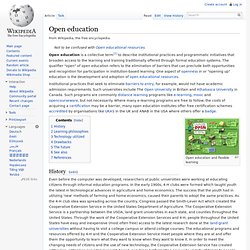
The qualifier "open" of open education refers to the elimination of barriers that can preclude both opportunities and recognition for participation in institution-based learning. One aspect of openness in or "opening up" education is the development and adoption of open educational resources. Institutional practices that seek to eliminate barriers to entry, for example, would not have academic admission requirements.
Open University. The Open University (OU) is a distance learning and research[5] university founded by Royal Charter in the United Kingdom.
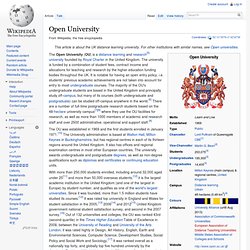
The university is funded by a combination of student fees, contract income and allocations for teaching and research by the higher education funding bodies throughout the UK. It is notable for having an open entry policy, i.e. students' previous academic achievements are not taken into account for entry to most undergraduate courses.
The majority of the OU's undergraduate students are based in the United Kingdom and principally study off-campus, but many of its courses (both undergraduate and postgraduate) can be studied off-campus anywhere in the world.[6] There are a number of full-time postgraduate research students based on the 48-hectare university campus[7][8] where they use the OU facilities for research, as well as more than 1000 members of academic and research staff and over 2500 administrative, operational and support staff.[9] Open universities. Open universities From Wikipedia, the free encyclopedia Jump to: navigation, search The term open university usually refers to a university with an open-door academic policy, i.e. no entry requirements.
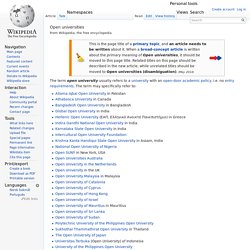
The term may specifically refer to: The term may also be used to refer to universities employing specific teaching methods: Open supported learning, a teaching method used by The Open University which is not the same as distance education or correspondence studyDistance education, but not all open universities focus on distance education and conversely distance education universities do not necessarily have open admission policies, e.g. the University of South Africa.
Retrieved from " Categories: Hidden categories: Navigation menu Personal tools Namespaces Variants Views More Navigation Interaction Tools. Open University. Open supported learning. Distance education. Distance education, distance learning, dlearning, or D-Learning is a mode of delivering education and instruction, often on an individual basis, to students who are not physically present in a traditional setting such as a classroom.
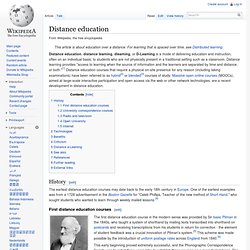
Distance learning provides "access to learning when the source of information and the learners are separated by time and distance, or both. "[1] Distance education courses that require a physical on-site presence for any reason (including taking examinations) have been referred to as hybrid[2] or blended[3] courses of study. Massive open online courses (MOOCs), aimed at large-scale interactive participation and open access via the web or other network technologies, are a recent development in distance education. History[edit] The earliest distance education courses may date back to the early 18th century in Europe.
Massive open online course. Poster, entitled "MOOC, every letter is negotiable", exploring the meaning of the words "Massive Open Online Course" A massive open online course (MOOC /muːk/) is an online course aimed at unlimited participation and open access via the web.[1] In addition to traditional course materials such as filmed lectures, readings, and problem sets, many MOOCs provide interactive user forums to support community interactions among students, professors, and teaching assistants (TAs).
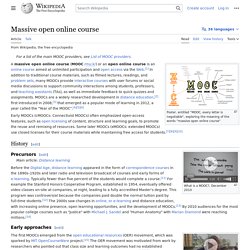
MOOCs are a recent and widely researched development in distance education which were first introduced in 2006 and emerged as a popular mode of learning in 2012.[2][3] Early MOOCs often emphasized open-access features, such as open licensing of content, structure and learning goals, to promote the reuse and remixing of resources. Some later MOOCs use closed licenses for their course materials while maintaining free access for students.[4][5][6][7] History[edit] What is a MOOC? E-learning. Use of technology in education to improve learning and teaching Educational technology (commonly abbreviated as EduTech, or EdTech) is the combined use of computer hardware, software, and educational theory and practice to facilitate learning.[1] When referred to with its abbreviation, EdTech, it is often referring to the industry of companies that create educational technology.[2][3] Definition[edit] Accordingly, there are several discrete aspects to describing the intellectual and technical development of educational technology: Educational technology as the theory and practice of educational approaches to learning.Educational technology as technological tools and media, for instance massive online courses, that assist in the communication of knowledge, and its development and exchange.
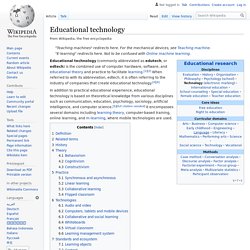
Related terms[edit] Educational technology is an inclusive term for both the material tools and the theoretical foundations for supporting learning and teaching.